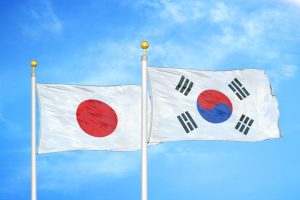The South Korean Presidential Blue House said on Monday that President Moon Jae-in will not visit Tokyo for a summit meeting with Japanese Prime Minister Suga Yoshihide.
Park Soo-hyun, a senior press secretary for Moon, made the announcement, saying that the decision was made after considering “various circumstances” and wishing Japan a safe and successful Olympics.
Seoul and Tokyo had spent weeks arranging Moon’s visit to Tokyo for the Opening Ceremony of the Olympics Games. Seoul has not unveiled specific reasons for its decision, but experts say that Seoul and Tokyo failed to agree on an agenda for the summit meeting.
A few days before Park’s announcement, South Korean local media reported that Soma Hirohisa, deputy chief of mission at the Japanese Embassy in Seoul, had made a lewd comment against Moon during a meeting with a reporter. Soma has been accused of calling Moon’s diplomatic efforts to improve the bilateral relations between South Korea and Japan as tantamount to “masturbation.”
Soma’s comment was not the official reason for the decision, but it strengthened South Korean public opinion that Moon should not visit Tokyo under the circumstances.
Suga said Soma’s comment was “inappropriate” for a diplomat and called it “very regrettable” to reporters. Tokyo’s chief cabinet secretary, Kato Katsunobu, and Aiboshi Koichi, the Japanese ambassador to Seoul, also called Soma’s comment inappropriate and regrettable on Monday.
The South Korean government has said that both countries had discussed preparations for a summit during working-level negotiations but failed to reach a constructive outcome. According to Seoul’s comment and local news reports, Tokyo consistently wanted to put the issues of wartime sex slaves (euphemistically known as “comfort women”) and forced labor off the table during the summit meeting. Japan was also reportedly reluctant to set aside the desired amount of time – more than an hour – for the summit meeting.
Nam Ki-jeong, a professor of Japanese studies at Seoul National University, told The Diplomat that although South Korea should seek ways to rebuild a relationship with Japan, Moon made the right decision at this moment.
Seoul wanted to use a potential summit “to solve Japan’s export regulations against the country and historical disputes… but it seems Japan had wanted South Korea to clarify its position on its Supreme Court’s ruling on Japanese corporations over wartime forced labor issues,” Nam said.
Seoul would prefer to build trust between the two countries by tackling Japan’s export regulations, their General Security of Military Information Agreement, and historical disputes one by one. However, it is believed that Japan demanded Seoul provide a clear stance and specific solution on the Korean Supreme Court’s ruling that Japanese corporations are liable for historical abuses. That demand was made clear during the working-level negotiations in the past few weeks.
After Moon’s decision was announced, Suga said he would continue dialogue with South Korea while maintaining Japan’s principles – which implies that his administration will only seek to rebuild bilateral relations with South Korea once Seoul has taken action on the Supreme Court rulings in 2018. South Korea, for its part, has made it clear that the government has no authority to overrule the Supreme Court’s decisions, which included ordering Mitsubishi and Nippon Steel & Sumitomo Metal to pay compensation to South Korean victims.
“Under these circumstances, it will be challenging for South Korea to build bilateral relations with Japan in a short period of time,” Nam said.
South Korean experts say it is impossible for the Korean government to come to agreement with the far right in Japan, given their warped view of history and politics linked to both countries. However, experts add that the Korean government is able to make appropriate demands on the Suga government and ruling Liberal Democratic Party (LDP) based on official comments LDP leaders have already made on Japanese imperialism and war crimes in World War II.
The statement issued by Abe Shinzo, Suga’s predecessor, in 2015 is the official position of the right-wing of Japan, experts say. South Korea can improve relations with Japan on the basis of that statement.
However, right now Suga’s top priority is the successful hosting of the Tokyo Olympics and winning in general elections, which must take place by October. Rapprochement between Japan and South Korea is likely to be discussed afterwards.
“Suga needs to focus on coronavirus quarantine, Tokyo Olympics and economic issues ahead of the LDP’s leadership race in September and the general elections which are going to be held within October,” Jo Yang-hyeon, head of the Center for Japanese Studies at the Institute of Foreign Affairs and National Security, told The Diplomat.
“Unless there is a meaningful concession from the Korean government on the issue of historical disputes, the summit meeting with Moon during the Olympics is not a helpful item to raise Suga’s approval rating,” Jo said.
Although the two sides could not align their interests enough to reach agreement on a summit meeting this time, the South Korean government seems to be actively communicating with the Japanese government to improve their relationship.
































